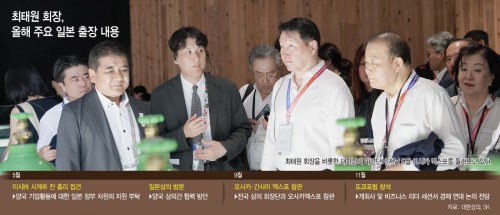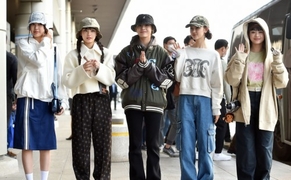 |
| Chey Tae-won, chairman of SK Group and head of the Korea Chamber of Commerce and Industry, speaks at an international forum earlier this year. Chey is expected to call for deeper South Korea-Japan economic cooperation during the upcoming Tokyo Forum 2025, highlighting AI and semiconductors as key pillars of regional integration. / Source: Yonhap News |
SK Group Chairman Chey Tae-won is expected to once again champion economic cooperation between South Korea and Japan at the upcoming Tokyo Forum 2025, proposing a new regional model for growth centered on AI and semiconductors amid fast-changing global conditions.
Chey, who has been playing a prominent role in business diplomacy as chairman of the Korea Chamber of Commerce and Industry (KCCI), will take the stage this time as the leader of Korea’s second-largest conglomerate, presenting a vision for a “Northeast Asian version of the European Union” built on cross-border economic integration.
According to the business community, the Tokyo Forum 2025—co-hosted by the Chey Jong-hyon Academy and the University of Tokyo—will take place on November 21–22. Chey will deliver opening remarks alongside University President Teruo Fujii on the first day and also join the Business Leaders’ Session.
Held annually since 2019, the Tokyo Forum brings together leading scholars, policymakers, and business executives. This year’s theme, “Rethinking Capitalism,” will feature discussions on inequality, sustainability, and technological transformation. Chey is expected to emphasize a new paradigm of economic solidarity and cooperation.
As KCCI chairman, Chey has consistently called for stronger economic ties with Japan. During a meeting in May with former Japanese Prime Minister Shigeru Ishiba, he stressed, “At a time when both Korea and Japan are suffering from the spread of global protectionism and mutual tariffs with the United States, expanding bilateral cooperation has become essential.”
He also visited the Japan Chamber of Commerce and Industry, reaffirming that “the relationship between our two nations is becoming increasingly important, and economic partnership continues to strengthen.”
In September, Chey joined the Osaka-Kansai Expo delegation, further underscoring his commitment to deepening bilateral cooperation.
Chey’s concept of economic solidarity goes beyond simple cooperation—it envisions a level of integration comparable to the European Union. He argues that a unified Korea-Japan economic bloc could form the world’s fourth-largest economic zone, following the U.S., EU, and China. Growth, he insists, cannot be achieved through trade alone but through joint development in strategic industries, notably AI and semiconductors.
Japan’s major telecom company NTT is currently developing the Innovative Optical and Wireless Network (IOWN), a next-generation communications technology, and SK Group has joined the project to collaborate on new semiconductor innovations.
Even amid his global engagements promoting the APEC CEO Summit, Chey has kept the Japan issue high on his agenda, meeting influential figures across the U.S., China, and other nations to rally support for regional cooperation.
Given his ongoing advocacy for Korea-Japan partnership, observers expect Chey to make economic integration and industrial collaboration key points once again when he addresses the Tokyo Forum next week.
Most Read
-
1
-
2
-
3
-
4
-
5
-
6
-
7





















